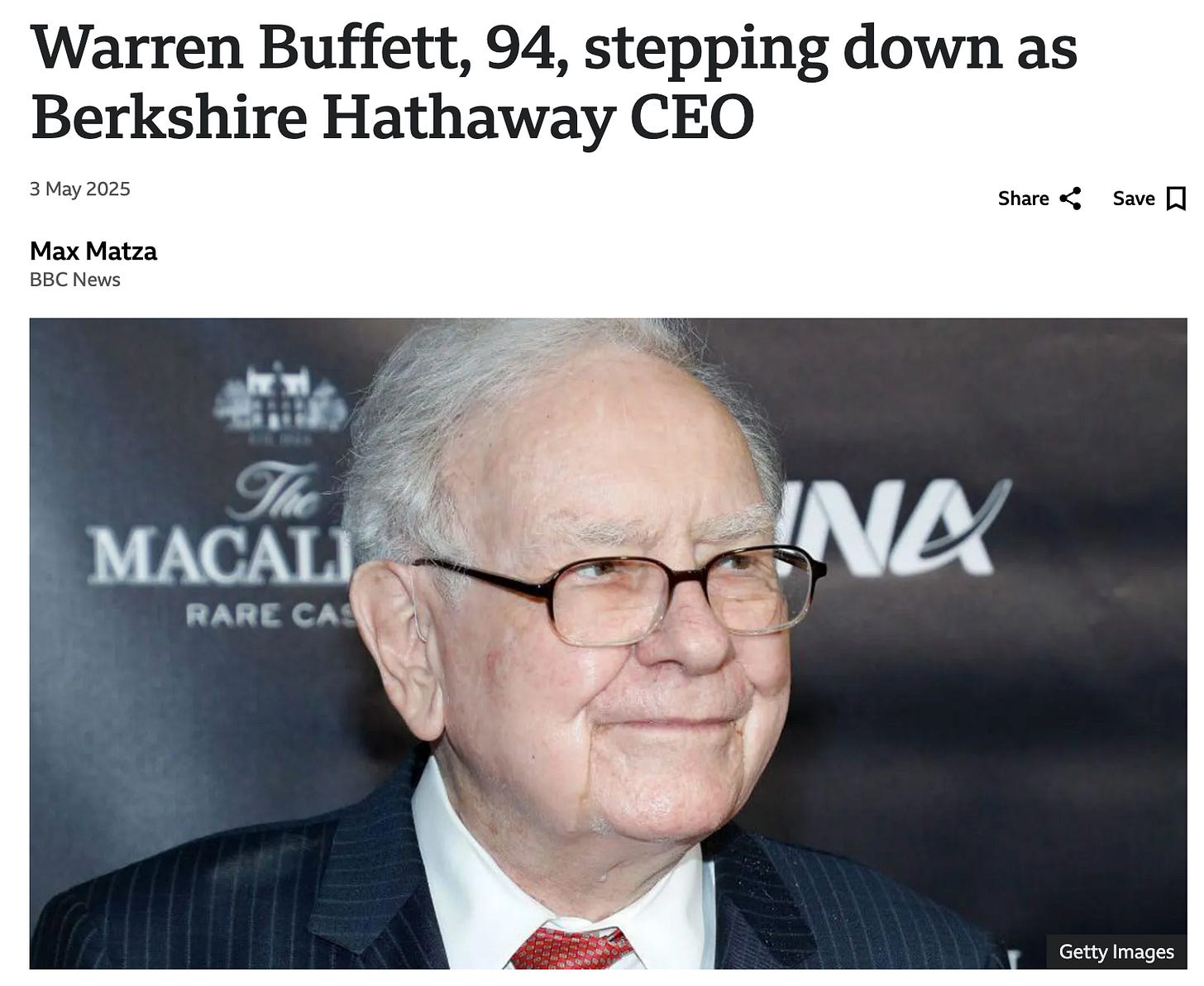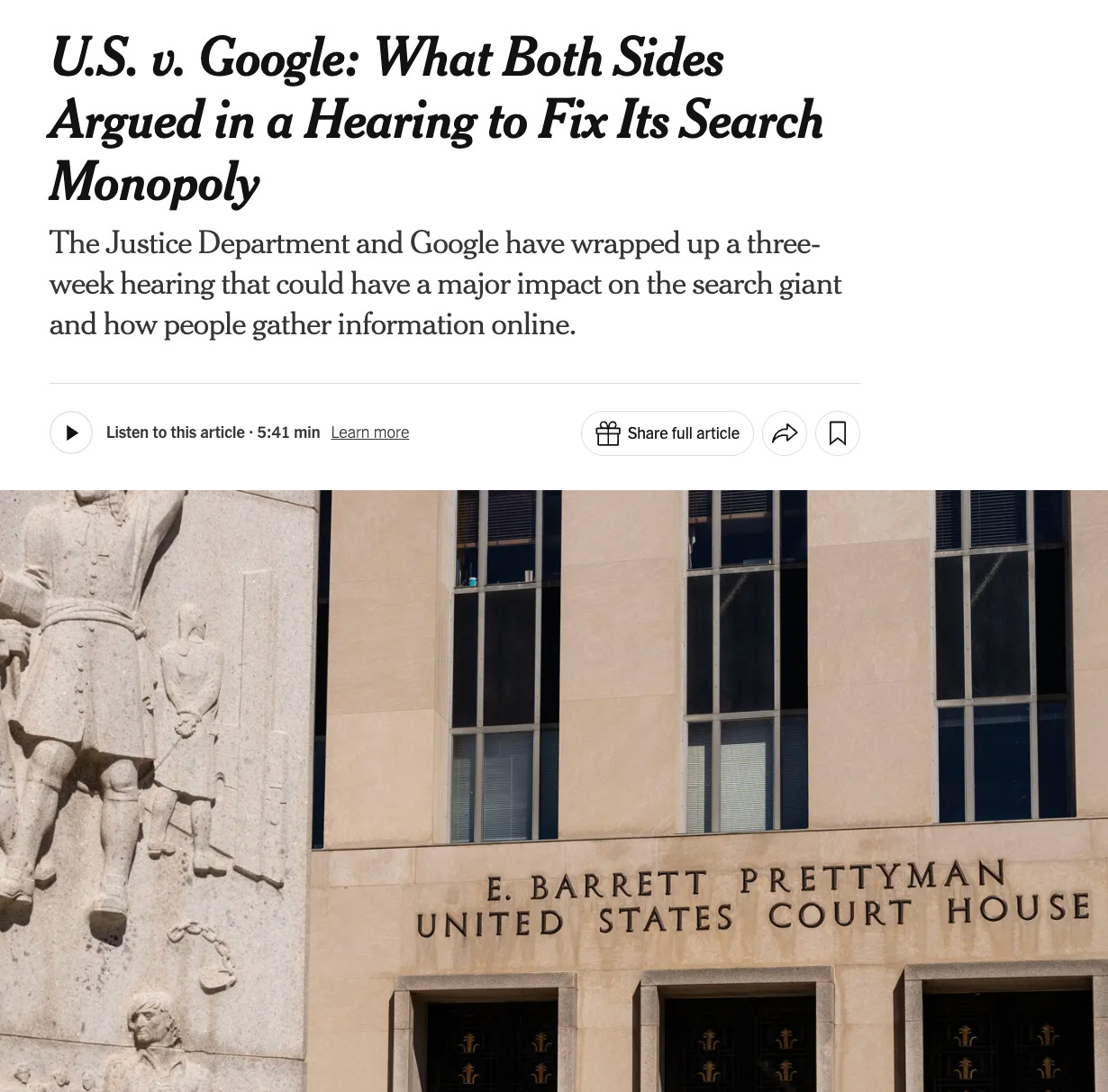🧾 Weekly Wrap Sheet (05/09/2025): Buffett’s Exit, OpenAI’s Pivot & The Trials of Big Tech
Buffett bows out, OpenAI grows up, founders recalibrate, and Big Tech goes on trial for the platforms it already owns.Warren Buffett is stepping down. The greatest investor of our time - maybe of all
🪙 Buffett’s Long Game Ends
Warren Buffett is stepping down. The greatest investor of our time - maybe of all time - is handing over the reins. Buffett turned a dying textile business into Berkshire Hathaway, one of the most valuable companies on earth, a $1.1T behemoth. Over nearly 6 decades, Buffett compounded capital 19.8% annually - compared to 10.2% for the S&P 500.
That sounds small, but it's a lesson in the ✨ power of compounding ✨ :
💵 $1,000 invested in the S&P? $275,000
💰 $1,000 with Buffett? Over $43 million
But the numbers, as staggering as they are, aren’t the whole story. Buffet was part philosopher, part operator, part strategist. His letters read like a blueprint for how to think better, not just invest better. Five lessons I’ll carry with me:
📓 “The stock market is designed to transfer money from the impatient to the patient.”
Your temperament is your edge.
📓“Only when the tide goes out do you discover who’s been swimming naked.”
Good times hide bad decisions.
📓“Forecasts may tell you a great deal about the forecaster; they tell you nothing about the future.”
Ignore noise. Study fundamentals.
📓“I try to buy stock in businesses that are so wonderful that an idiot can run them. Because sooner or later, one will.”
Resilience beats brilliance. Moats > heroes.
📓“It takes 20 years to build a reputation and five minutes to ruin it. If you think about that, you’ll do things differently.”
Character compounds too.
Buffet was capitalism’s monk - disciplined, ethical, long-term greedy. He didn’t just beat the market. He beat noise, ego, and complexity, and left us with a blueprint that’s increasingly rare: Think clearly. Act slowly. Play long games.
🧠 OpenAI's Restructure of the Restructure
OpenAI wanted to benefit all of humanity. Then it tried to become a for-profit. Turns out, all of humanity had thoughts
After a wave of legal, reputational, and strategic pressure - lawsuits from Elon Musk, amicus briefs from ex-employees, letters from Nobel laureates, and a few polite conversations with state Attorneys General - OpenAI has decided to restructure its restructure. ➡️ The nonprofit will retain control. The for-profit arm will convert into a Public Benefit Corporation (PBC) - like Anthropic and xAI. And everyone gets to pretend this was always the plan.
📉 Fed Holds, Volatility Doesn’t
It was FOMC day this week. As expected, the Fed held rates steady at 4.25%-4.50%, a decision already priced in by 98% of market participants.
So why the rollercoaster? Powell admitted what few central bankers do: we’re operating in the fog.
Here are 5 takeaways that mattered more than the rate decision itself:
❗Sentiment ≠ Spending. Yes, consumer sentiment is in the dumps. But actual spending? Still resilient. Powell made it clear: the Fed won’t be swayed by soft data or headline noise. “We are well positioned to wait for greater clarity before considering any adjustments to our policy stance.” He is signaling that the cost of premature action (either hike or cut) is greater than the cost of waiting. That’s a rejection of both market pressure and political interference.
❗ Stagflation Risk. Another terrible economic term to add to your dictionary of despair. The Fed flagged that there are "risks to both sides of its dual mandate" with the potential for stagnant growth and stubborn inflation. If you're dusting off your macro textbooks, turn to the page titled “1970s.”
❗Tarriff wildcard. “If the large increases in tariffs that have been announced are sustained, they are likely to generate a rise in inflation, a slowdown in economic growth, and an increase in unemployment.” Powell didn’t hedge much here: tariffs are inflationary, recessionary, and potentially destabilizing. We are in a world where policy-driven shocks (not demand-driven ones) dictate outcomes.
❗Trust is Key. “Avoiding [persistent inflation] will depend... ultimately, on keeping longer-term inflation expectations well anchored.” Translation: the Fed knows that inflation psychology can be self-fulfilling. If people stop trusting the Fed to contain inflation, it won’t matter what the models say. This is Powell saying: perception is policy.
❗Fed has limits. “We don’t have the kind of tools that are good at dealing with supply chain problems.” This may be the most honest and under-appreciated line. Monetary policy is a blunt instrument - and Powell is publicly acknowledging that in a world of geopolitical shocks, fiscal shifts, and exogenous supply constraints, interest rates alone won’t steer the ship.
So where did we land for the day? Dow +0.7%, S&P 500 +0.43% after swinging between red and green. 📊 Expect more chop as macro data whiplashes investor expectations. The Fed is data-dependent, and the data, right now, is a Rorschach test.
🧗 Startup Strategy in the AI Floodplain
In my AMA at Startup Grind, one truth kept surfacing: it’s never been easier to build a product - and never harder to build a defensible company. Key ideas:
🔹 The Stack is Compressing, But Innovator’s Dilemma Still Exists: Everyone wants to “own the stack.” Foundation model companies are coming for the application layer. Big Tech wants it all - infra, models, interfaces.
So how do startups win? They lurk in places that look too small, too messy, or too boring - until they aren’t. They out-care, out-learn, and move faster than incumbents can copy.
🔹 Only the Paranoid Survive: If you think you have no competition, you’re not paying attention. Your competition is not just other startups. It’s OpenAI. It’s Apple Notes. It’s Microsoft Excel. It’s inertia. It’s "good enough."
If you’re replacing something, budget exists.
If not? You’re in evangelism mode - and that’s a harder sale.
Always ask:
– Who am I replacing?
– How do I unlock budget?
– What will kill me in 12 months that doesn’t exist today?
🔹 Momentum ≠ Moat: Early traction feels great. But will it still work when the copycats show up? Ask yourself:
- Does my product get stickier with use?
- Do I grow as my customers do - or am I just the first thing that worked?
- What happens when someone shows up 10% faster and 10% cheaper?
🔹 You Can’t Start as a Platform: “We’re a platform” too early often means “we’re terrified of saying no.” Early on, focus is a moat. Pick one thing. Do it obsessively.
The Early No is almost more helpful than the Yes because it helps you figure out what business you’re actually in. Get religious about your ICP. Saying yes to everyone is a great way to build... nothing.
The age of infinite tools and zero moats is here. There’s no perfect playbook - just a few lessons that hold up when things get noisy. What’s been your sharpest learning while building in this AI-saturated, hyperscale-heavy world?
⚖️ Big Tech Goes to Court
Turns out the most disruptive force in tech this year isn’t AI - it’s antitrust law from the 1890s. If the world weren’t so dramatic right now, Big Tech’s antitrust reckoning would be front page news, not buried beneath the fold. But while AI headlines dominate, the future of social and search are being litigated in courtrooms, slowly, but with consequences that could outlast any model release.
In one corner:
👉 Federal Trade Commission v. Meta. This trial hinges on one deceptively simple question: What even is social networking in 2025? At the center of the case is a 2006 quote from Mark Zuckerberg: “Facebook is about real connections to actual friends.”
The FTC is arguing Meta used the friend graph - Facebook, Instagram, Whatsapp -to monopolize “personal social networking.”
Meta says that definition is outdated. Social media today is less about connection, more about consumption - an infinite scroll of short-form entertainment, algorithmic discovery, and parasocial engagement. Under that broader lens, Meta argues it has plenty of competition: TikTok, Youtube, Reddit, even LinkedIn.
The judge now faces a complex task: ✨defining what the market is✨
If he agrees with the FTC’s narrow definition, Meta looks like a monopolist. If he goes with Meta’s broader framing, the case falls apart. And that’s the heart of the case: how do you define a market in a world where features blur, platforms converge, and consumer behavior evolves faster than regulation? If the FTC wins, it could set precedent to unwind other tech acquisitions retroactively
👉 The Department of Justice v. Google trial has already ruled that the company illegally maintained a monopoly on search by paying billions to be the default on Safari, Firefox, Android, and more.
Now, the question is: ✨What’s the remedy?✨
Break up Chrome?
Share search data with competitors?
Block Google from playing the same game in AI?
Google says these proposals would “break the internet", that it’s all too extreme - it threatens user privacy, product quality, and the stability of the open web. They’re offering contract changes and pointing to ChatGPT as proof that search is already changing.
These two legal cases are stress tests for how well 20th-century antitrust frameworks can govern digital economies where: the product is free, the data is proprietary, and the real competition is for time and dopamine.
If regulators win, we may see breakups, new rules, and a colder climate for M&A.
If they lose, the message is clear: build fast, buy faster, and scale before the laws catch up.
💭 And somewhere in the background, a judge who doesn’t use social media is being asked to decide if WhatsApp competes with Reddit. Best of luck to him.
🧾 TL;DR
Buffett leaves with one final lesson: discipline scales. So does character.
OpenAI restructures again - trading complexity for clarity, and control for legitimacy.
The Fed is flying blind in a noisy macro fog - but it’s not blinking.
Founders are rethinking moats, markets, and messaging in an AI-saturated world.
Big Tech isn’t just shaping the future - it’s defending the past in court.









